|
This booklet was compiled to celebrate the special tribute to
Solly Marks at the 2004 SAGES Banquet on 7 August in recognition
of his outstanding and life-long contribution to gastroenterology.
We were fortunate to receive many contributions which are a
small sample from the many people who shared his remarkable
professional career.
We hope that this tribute will be a special momento of this occasion
and to be kept for posterity.
"Enjoy!"
|
| |
|
|
2.
|
The GI Clinic and a
South African
perspective
|
| |
Flip Bornman & Jake Krige
|
| |
|
|
10.
|
An international perspective
|
| |
Peter Cotton
|
| |
Richard Hunt
|
| |
|
|
15.
|
A prots perspective
|
| |
Irvin Modlin
|
| |
|
|
17.
|
Past GI Clinic colleagues
|
| |
Simmy Bank
|
| |
Gil Barbezat
|
| |
Ben Novis
|
| |
Jonathan Clain
|
| |
|
|
23.
|
Cape Town & practice perspective
|
| |
Andy Girdwood |
| |
|
| 27. |
GI Staff |
| |
|
Laboratory
|
- Gerry Young
|
| |
|
Secretary
|
- Maureen Bloch
|
| |
|
Nursing
|
- Helene Negrine
|
| |
|
Research trial nurse
|
- Wendy Lucke
|
| |
|
|
31.
|
Messages from colleagues around the globe
|
| |
|
|
33.
|
Classic "Sollyisms"
|
| |
|
| |
|
|
|
| |
|
| |
|
| |
|
| |
1. 2004 A Tribute to Prof I.N. Solly Marks
|
| |
|
| |
|
|
|
A TRIBUTE TO I.N. (SOLLY) MARKS
|
|
|
By Flip Bornman &
Jake Krige
|
| |
Israel Nathan (Solly) Marks was born on 23 October 1926 in Cape Town, one of
5 children of Philip and Leah Marks. His school education began at Victoria Road,
followed by Mountain Road, SACS, ST Andrews in Bloemfontein and Woodstock
High in Balfour street. Then for reasons, which only Solly can explain he was sent
to Union High School in Graaff Reinet where he matriculated as the top student
in 1942, winning the Papenfus award. He returned to Cape Town in 1943 to commence
his studies in medicine at UCT obtaining a BSc in 1945 and MBChB in
1949, which was followed by three years internship/senior house officer at
Groote Schuur Hospital (1950-1952). Solly left the shores of South Africa in 1953
and did his post graduate training as a medical registrar in the Gastrointestinal
Unit at the Western Hospital Edinburgh and then in 1956, having received the
Ames Award in Gastroenterology, he took up the Fels research post and instructor
in Gastroenterology at the Temple University Hospital in Philadelphia.
After 9 years absence, Solly returned to Cape Town in 1959 with a wealth of
experience in both clinical and basic research in gastroenterology which included
pioneering studies he did with Wilfred Card in Edinburgh on the relationship
between parietal cell mass and acid output in the stomach. With these new skills
he tenaciously pursued the goal of establishing a GI Clinic, which would provide
a scientific basis for gastroenterology in Cape Town. He made maximum use of
the abundant clinical material and the excellent spirit of collaboration between
the Departments of Surgery and Medicine, which laid the foundations of the GI
Clinic.
The Clinic's beginnings were humble; funds were scarce, there was limited space
[2 rooms in J1 which was situated in the bowels of the old GSH] and very little
endoscopic and laboratory equipment. But not for long; Solly soon surrounded
himself with handpicked medical, nursing and laboratory staff who supported
him in his vision of the Clinic, becoming a leader of gastroenterology in South
Africa and achieving international recognition.
These goals were achieved in record time with the remarkable partnership
between Solly and Simmy Bank who joined him in 1961 as the Ben May Fellow
in Gastroenterology and which lasted for 18 years. Many others were to join as
consultants and career registrars during the formative years of the sixties and
early seventies, and together they became a formidable team which provided an
excellent service with outstanding research and publication output. Every effort
was made to strengthen overseas ties by participating in international congresses.
The Clinic became a veritable frontier at the tip of Africa and a Mecca for
overseas visitors and researchers with an interest in gastroenterology.
The way in which Solly sought and nurtured the invidious relationship with the
Department of Surgery is yet another example of his visionary genius in building
a unique integrated medico-surgical GI service and collaborative research
programme to the benefit of both Departments. In the early days Prof Jannie
Louw provided the majority of sessions, and much of the moral and academic
support for him as Head of the GI Clinic. Solly also jealously guarded the interests
of nursing, laboratory and administrative staff who were incorporated as
an integral part of the Clinic from the beginning. He was a father figure to all,
creating an atmosphere of a big happy family.
Prior to 1962 South African gastroenterology meetings formed part of the annual
Medical Association congress. In 1962 Solly drummed up sufficient support
around the country to consolidate gastroenterology in South Africa and form a
society specific to the needs of the speciality. Founder members included
Solly, Simmy Bank and Mike Moshal. At the inaugural meeting in Durban Solly
was elected President of SAGES and remained in the chair from 1962 to 1977
and was then voted Life President. With characteristic vision Solly encouraged
a wider membership of the Society in the early 70's when many surgeons
became involved in endoscopy and became members of SAGES. The effective
partnership of physicians and surgeons remains an enduring strength of
SAGES. As Life President Solly continues to dispense sage advice.
No better example can be found of his loyalty to the Clinic when he took up the
headship of the Clinic again in 1978 at a time of crisis with the exodus of senior
members of the Clinic. Solly wisely reached out to young members of the
Department of Surgery who showed an interest in gastroenterology and offered
them space in the new GI Clinic. This move paved the way to formalize the surgical
presence in the Clinic in 1982 when Prof John Terblanche appointed Flip
Bornman as Head of Surgical Gastroenterology and Mike Elliot the Head of
Colorectal Surgery. This unique partnership between medical and surgical gastroenterology
ushered in a new era for the Clinic and allowed the Clinic to
become a truly integrated medico-surgical Clinic.
Realising the lack of expertise in the rapidly developing field of interventional
endoscopy, and the need to fill the hiatus left by the exodus of medical gastroenterologists,
Solly managed to solve the crisis by attracting superbly
trained gastroenterologists from Peter Cotton's GI Unit at the Middlesex in
London (Adrian Hatfield, Mark Denyer and Tony Mee). This move helped to turn
the tide and steady the ship and, moreover, ensured that the new generation of
gastroenterologists would receive adequate training in interventional
endoscopy. Solly also had the wisdom of allowing the medical consultants to
find their own niche and expertise in the Clinic, most noticeably when he asked
John Wright to take on the responsibility of the Inflammatory Bowel Disease
Clinic, Stephen O'Keefe the Nutrition Clinic and more recently Japie Louw to
spearhead the research in H.pylori related diseases. The era of subspecialisation
had begun, both on the medical and surgical side, which benefited training
and research output.
It was only fitting that the University of Cape Town recognized his life-long dedication
to the GI Clinic and his academic standing nationally and internationally
when he was appointed to the new Chair in Gastroenterology in 1986, a position
he held until his retirement in 1992. There are few equals when it comes
to his academic achievements. He is the author or co-author of more than 400
publications which include over 30 invited chapters in various text-books in
gastroenterology, he gave 47 named and post-graduate lectures and attended
innumerable national and international congress as invited lecturer or chairman.
Solly is amongst the select few who attended every World Congress of
Gastroenterology and South African Gastroenterology Society meetings since
their inception. Other prestigious awards to name but a few include; Fellow,
University of Cape Town, Honorary Life President South African
Gastroenterology Society, Honorary member of the British Society of
Gastroenterology, Australian Gastroenterology Society, Pancreatic Society of
Great Britain & Ireland and the Prout Club. In recognition of his services to
Gastroenterology in South Africa he received the Salus Gold Medal from the
Department of National Health in 1993.
It came as no surprise, that after his official retirement, Solly continued to keep
a fatherly eye on the development in the clinic until this very day. He would not
hesitate to express his concerns and at times annoyance when bureaucratic
and political infighting threatened the fabric of the Clinic. It is difficult to imagine
where the clinic would be today without Solly's guidance throughout its history.
His guiding hand can be seen at every important phase of the clinic's
development, particularly in times of crisis, of which there were many. Solly's
ability to see the wood from the trees, to draw on available expertise or, if not
available, to find it elsewhere was quite remarkable and reflects the qualities of
a true leader. It is also difficult to imagine how much poorer we, his protégés,
would have been without his remarkable mentorship. He taught us the
nuances of gastroenterology and the skills to improve our clinical acumen.
Solly's "lateral thinking" and his ability to find weaknesses in data, conceptually
and otherwise, was legendary " all this rubbed off on those around him
including his puckish humour and unique philosophy of life. He had the ability
to inspire enthusiasm for doing research, to write [and how to write] and, above
all, to enjoy this even if it meant spending long hours during evenings and
weekends crossing the t's and dotting the i's while Solly rewarded the flagging
co-authors with slices of biltong. Other memorable moments included Solly
conducting "ward rounds' in his magnificent garden and "inflicting" his unbridled
passion and wealth of botanical knowledge on those present.
This tribute would be incomplete without recognizing the contributions of his
gracious wife, Inge, who has loyally supported Solly throughout his professional
career. Who will ever forget the social evenings with them at home, which in
no small way fostered the camaraderie amongst members of the Clinic.
"Man is a history making creature who can neither repeat his past nor leave it
behind"* " Solly did it his way with aplomb.
*Auden WH; The Dyer's Hand. 1963.
5. 2004 A Tribute to Prof I.N. Solly Marks
|
| |
|
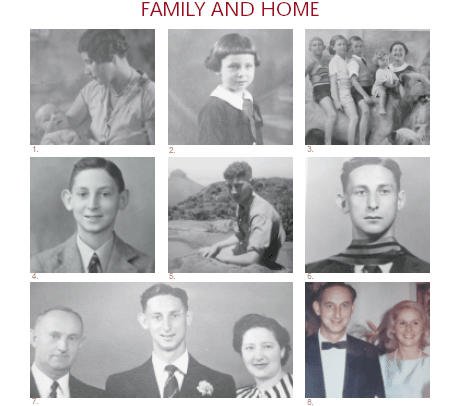
|
- With Mom
- Terrible Three's
- With Siblings & Mom
- Adolescence
- Graaff Reinet Days
- MBChB Graduate
- With Parents
- Handsome Couple
|
|
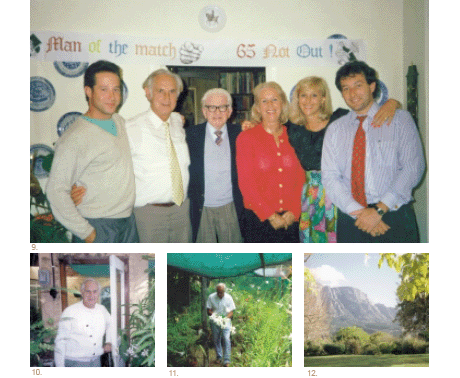
|
- Family : Three Generations
- "In the Hot Seat"
- Solly's Passion
- Their "Pride"
|
|
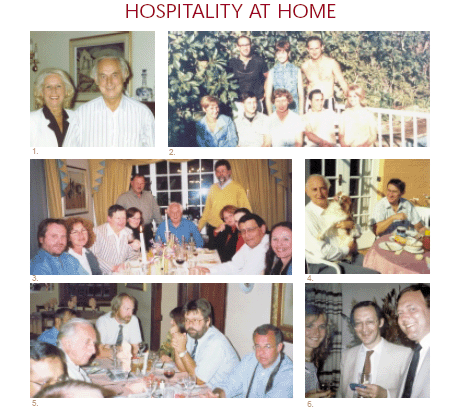
|
- Gracious Hosts
- Early days with GI colleagues
- The "Godfather"
- Breakfast at Dunkeld Lodge with Simmy Bank
- Serious Business
- Mark Denyer (middle) & Adrian & Diane Hatfield
|
|
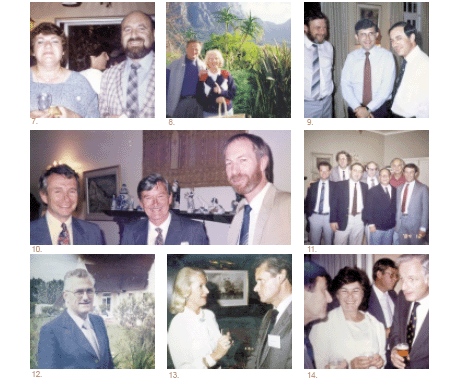
|
- Helene Negrine & Selwyn Odes
- Hosting Peter Cotton
- Ralph Kirsch, Israel Rachmelovitz, Solly Benatar
- Steve O'Keefe, Gerlad Burke, John Wright
- 1984 Reunion "Old Boys Club"
- Gaston van Trappen at Southern Cross House
- Inge looking after Mynhard Classen
- Ian Macleod (Durban)
|
|
|
TRIBUTES WITH AN
INTERNATIONAL PERSPECTIVE
|
|
|
Peter Cotton
|
|
|
|
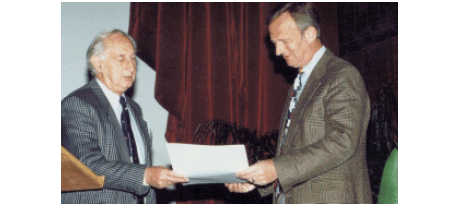
|
| |
I am proud, honored and delighted to participate in this celebration of Solly
Marks' wonderful career in Gastroenterology. He is truly one of the giants of our
profession. He has had an enormous influence in the field, through his own contributions,
through the work of his trainees and collaborators, and through his
influence on innumerable friends throughout the world.
We met first in 1973, when Mike Moshal arranged for me to visit Durban and
Cape Town under the auspices of the Medical Research Council. That visit
focused on developments in endoscopy, and a new technique called ERCP. Solly
was never an ERCP afficianado, but it is one measure of the man that, unlike
some of his generation, he did not dismiss it, but indeed encouraged several of
his young colleagues to master the field. Many of them have made considerable
contributions, and some are here tonight.
My personal bond with Solly has several strong roots. At the beginning I was
much influenced by his work and clear writings on chronic pancreatitis, much of
it in collaboration with Simmy Bank. His detailed clinical analysis of large series
of patients struck a chord with me that some of the erudite ramblings of other
Pancreatologists did not. We were also both interested in the frustrating subject
of pancreatic function testing. He was a key contributor to the workshop which
we organized in Cambridge 25 years ago on the classification of pancreatitis. Its
conclusions were no more confusing than the ones that preceded and succeeded
it.
The second element was my admiration for his ability to cut quickly to the key
points in any topic and discussion, and his forthright ability to smell and expose
BS. He did that to me once, in classic style, when he visited the Middlesex
Hospital in the mid 1970's. His hand went up when I was in the middle of a naïve
and pompous lecture on Sphincter of Oddi dysfunction. Expecting a shaft of scientific
light, I yielded to the great man, who then deflated me by saying, "Peter,
you are trying to sew flatus to moonbeams". While his sword was sharp and
accurate, it was always wielded with sensitivity and humor, so that the wounds
were superficial " almost enjoyable- and did not scar. His own lectures, often
related to ulcer disease, were informative, pithy and amusing, and sometimes
deliciously outrageous.
The third thing that impressed me about Solly, increasingly so as the years rolled
by, was his indefatigable resilience in nurturing his baby, the GI Unit at Groote
Schuur. As many here know well, there was considerable turnover of key faculty
in the difficult middle years. Time and time again he had to drag himself back
from his beloved proteas and orchids to regroup and rebuild. I'm not sure that he
always got the credit for that persistence, but he certainly does here tonight. The
Unit stands as a bright monument to his dedication. I was delighted when we
were able to develop a closer relationship between it and our small unit at the
Middlesex, through folks like Norman, Tony, Adrian and Mark.
The fourth and most important bond is one we all here share, that of friendship.
Friendship is difficult to analyse, but easy to feel. And, that feeling certainly
includes Inge. What a great couple, always cheerful, considerate, and fun to be
with.
Thank you, Solly, we love you.
Peter B Cotton August 2004
Director, Digestive Disease Center
Medical University of South Carolina
11. 2004 A Tribute to Prof I.N. Solly Marks
|
|
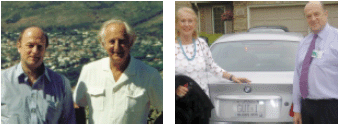
|
| |
Dear Solly,
It is an honour and pleasure to congratulate you on the enormous contributions which
you have made to gastroenterology over a long and illustrious career. You have been
widely recognized by many of us working far from South Africa as an outstanding academic
who has made their mark across the spectrum of our specialty as clinician,
teacher and researcher.
Before we got to know each other, I had read many of your writings and we had been
together at the Royal College of Physicians in London for the launch of Cimetidine.
However, our first real meeting was at the European Congress in Hamburg, where you
were chairing a session in which I presented. I recall your challenging and perceptive
questions and our parrying responses which laid the ground for the next quarter century
of discussion and debate.
During your extensive training in the UK and in the US you were mentored by some of
the greatest names in gastric acid physiology and this provided you with a wonderful
platform on which to establish the Cape Town unit. The concentration of talent and skill
which you assembled was recognized from afar and your prodigious work contributed
to the excellence in clinical and interdisciplinary care of patients with a wide spectrum
of gastrointestinal disease for which you and the unit became so well known.
It was, therefore, no surprise that we were able to meet so frequently in such far flung
and wonderful locations as Maui, Hong Kong, Shanghai, Sydney, Cairns and Victoria
Falls to name just a few. Moreover, your contributions to the Hanbury Manor meeting
were amongst the most important! But it was your wonderful welcome on my several
visits to South Africa which I will always remember for the gracious and generous hospitality
which you and Inge provided " even to providing me with my own telephone
number in the Cape Town directory! In particular I will cherish your generosity of time,
and our discussions " often over a prolonged breakfast in your garden or the guest
house " with your unique blend of philosophy and science which has had a lasting
impact on me and on all who have been privileged to train with you or know you.
Thanks from us all, Solly and very best wishes to you and Inge for the future. I look forward
to continuing the next round!
As ever, Richard
Richard Hunt
Professor, Division of Gastroenterology
McMaster University Medical Centre
12. A Tribute to Prof I.N. Solly Marks 2004
|
|
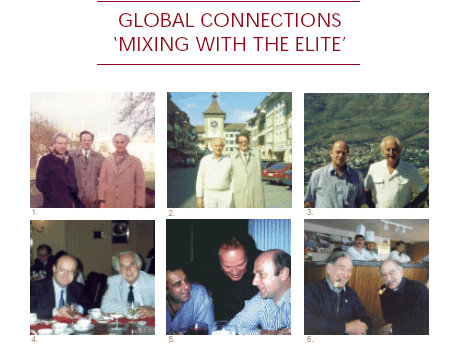
|
- Michel Cremer & Peter Cotton (Belgium & USA)
- Fred Halter (Switzerland)
- Richard Hunt (Canada)
- Guido Tytgat (Netherlands)
- Irvin Modlin, Nic Wright & Richard Hunt
- Mixing with the Nobel Laureate Cohen (left) of EGF fame
13. 2004 A Tribute to Prof I.N. Solly Marks
|
|
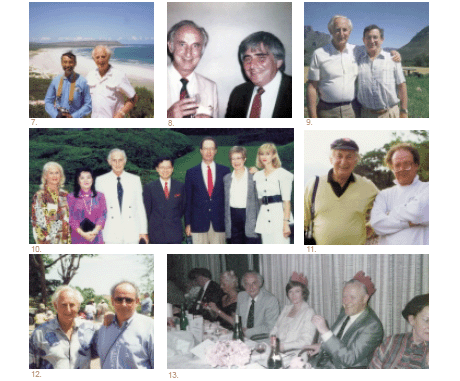
|
- S Bardham (UK)
- H Conn (USA)
- Simmy Bank
- Travelling in the East
- Nic Wright (UK)
- George Sachs (USA)
- Anita & Stuart Saunders
14. A Tribute to Prof I.N. Solly Marks 2004
|
|
|
REFLECTIONS OF A
PRODIGAL PROTÉGÉ
|
|
| Irvin Modlin |
|
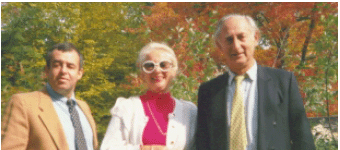
|
| |
I was delighted when Phil Bornman asked me to reflect on my status as a protégé
of Solly since I have long sought a venue to express my gratitude. The definition
of the term "an individual who has received support and protection from
an influential patron who furthers the protégée's career" more than describes the
influence Solly has had on my life but fails to recognize the vast amounts of
Kanonkop and Le Bonheur that were required to facilitate my understanding of
the process.
It also fails to include the more recent usage of the term protégé as an opensource,
Java tool that provides extensible architecture for the creation of knowledge-
based applications supporting the editing of semantic Web ontologies, thus
further defining Solly's role in representing to me the importance of communicating
knowledge.
Until I met Solly I had long labored under the impression that Markovian analysis
was a random process in which the probabilities of states in a series depended
only on the properties of the immediately preceding state or the next preceding
state, independent of the path by which the preceding state was reached. Such
turgid misconceptions were dramatically altered by the pleasures of GI ward
rounds and subsequent dinners that enabled Solly to explain to me that gastric
acid secretion was a direct and finite extension of entropy and that this not only
encompassed the parietal cell but included Komarov1, gastrin2, the Russian revolution
3 and the reflections of Card4 as opposed to poker5 which he held to be the basis
of the moral decline of society6. He further opined that the exploration of peptic ulcer
disease was not limited by either the bending of light in Parisian fountains7, which
he proposed to be the basis of the development of endoscopy8, but could be
extended to include aspects of chemical communication in the sexually deceptive
orchid genus Cryptostylis8, although he did not exclude the possibility of gastrin also
being implicated. Discussions of reflux9, Winkelstein10, the tablets (everyone knows
which ones-not the Mosaic type11 but those you trade in for airtickets), Mt Sinai and
the Oudtshoorn connection12 were deferred to desert and we never finished that
part of the discussion because the Boks were playing"¦..
I, like everyone who knows Solly have luxuriated in his fertile wit, roared with laughter
at his quintessially theatrical style and imbibed not only the pleasures of his table
but the sagacity of a mind possessed of exquisitely refined fact and even some
fable. The kaleidoscope of international persona that he introduced us to, the critical
analysis of data, the Talmudic insight and the breadth of his humanity are only
some facets of a complex and sensitive individual whose life and times encompass
all in the room this evening who share the delights of his amity.
We are all enhanced to be able to count Solly as a friend and this Society will now
and forever bear tribute to his contributions and a lifetime spent in the care and support
of others.
I know that as he reads this he is muttering to himself "Mundus vult decipi, ergo
decipiatur"or perhaps he's just humming "Popoculus nautus sum, Popoculus nautus
sum, pugnabo ad finem, quod edero spinem, Popoculus nautus sum"¦."
Anyhow as the great American intellect and rapper Cutty Sark commented, "Solly
you're da man!" "¦and I am proud to be your proDJ.
Tibi vero corde.
Irvin Modlin
Class of Clifton IV, 1975.
References:
- A life of Toil -Travels to and from Canada .R. Hunt 1934.
- Gastrin as the molecular basis of medical meetings. Edkins et al 1905.
- Why I left the Stettel. Collected memoirs of the Schmatter consortium. 1902
- Reflections on the physiological basis of the digestion of haggis. Ed. Card 1955.
- Poker-a moment of bliss, a lifetime of Acyclovir. B. Cairfool. 1975.
- Recreational pharmaceutical regulation of posturally induced reflux in the post orgasmic phase of nocturnal breakthrough. Personal communication Billie Bob.
- Parisian Nightlife-a retrospective review. S. Bank 1980.
- Life is an Orchid garden. S. Marks 1985
- What goes up must come down. Blood Sweat and Tears. 1973.
- I said it First. Asher Winkelstein. New York, NY 1934.
- Essays on mountaineering. Aaron et al. 2540BC
- Role of the Rose brothers in GERD. Apocryphi de inebriati, Atheneum 2004
16. A Tribute to Prof I.N. Solly Marks 2004
|
|
|
GI CLINIC COLLEAGUES "
REMINISCING ABOUT THEIR TIMES
WITH SOLLY IN THE GI CLINIC
|
|
| |
| |
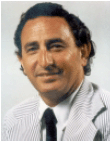
|
Simmy Bank
In 1961 Solly and I (The "Gastric Juice") started
"SAGES", beginning a partnership of twenty-six
extraordinary years.
This is a time that I will never forget: Solly's incredibly
sharp mind, invaluable skills and striking personality
were a vast influence on me, and eventually
stood me in great stead when heading a GI
Department both at Groote Schuur and in the USA
and still counting.
I would be unable to tally up the number of times that I have quoted Solly's
|
aphorisms, advise, personality traits and expertise to scores of Fellows, Residents,
Consultants, Surgeons in the USA " to the point that he is as well know in
America, through this as through his publications.
Those endless nights that we laboured till the early hours of the morning, over our
plus-minus, two hundred and fifty publications and abstracts, doing our own statistics
in now antique machines are still fresh in my mind " but most of all the
smoking and endless slithers of biltong, deftly cut with Solly's pocket knife.
While completing our "Magnum Opus", on Pancreatic Disease in his Clifton flat,
the record of "Arrivederci Roma" repeated itself at least a hundred times while I
battled to finish graphs, with Solly taking the odd nap till we cracked the paper.
When Dr Renshaw, a home grown Sexologist, returned from the USA and was
giving a lecture at the same time as our original SAGES meeting, only three stalwarts
gathered to hear us. Solly summed up the situation with his usual aplomb
as "Sex beats GI every time".
We were the first to mix different races at our Clinic and to have to defend ourselves
to patients who complained about the use of the same equipment for
White and Black.
Solly introduced the "Saturday Morning Special", where it was mandatory for
Second Year Medical Students to have an intubated Gastric Acid test before they
could advance to the third year. Highly illegal, but much invaluable data.
The "Coup de Gras", came when Solly was asked to endoscope the second
most expensive racehorse in South Africa: That saga, a story on its own, as this
was the first animal to be endoscoped will live on in history or infamy. The only
regret was that we did not film the episode as we would have no doubt won the
Cannes Film Festival award for best documentary.
As the word spread of our endoscopic expertise, Solly was asked to locate, by
helicopter, a missing bolt from the engine of an offshore tanker. The enthusiasm,
by both of us for this venture can only be described as underwhelming, but Solly
nevertheless undertook this fruitless enterprise.
Medical patient and staff stories of "Sollyisms", range from the ridiculous to the
truly sublime, but it is because of his enthusiasm and work ethic that we did more
investigations in the 1960's, in one room, in one day (3 acid tests, 2 pancreatic
function tests, 2 intestinal biopsies, 3-6 rigid endoscopies, as well as fitting in
ward rounds) than most GI units achieved in many weeks.
Hail to the Chief!
Simmy Bank
North Shore/Long Island Jewish Health Systems
Professor of Medicine
Albert Einstein College of Medicine, New York
|
| |
| |
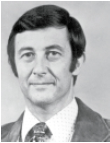
|
Gil Barbezat
The first time I saw Solly was soon after he returned
to Cape Town from the USA. He was conspicuous
on the roads around the Hospital and Medical
School behind the wheel of his Chev convertible,
nicknamed "SS Gnormous" by the students. Soon after, as a fourth year medical
student, he asked me to assist him to establish intravenous access to a
patient having a pancreatic function test in a medical ward. My job was
to hold the rubber band tourniquet while he put in the needle. After
searching briefly but unsuccessfully for a vein, he looked at me and
came out with a typical Solly comment: "You know, the beauty of your
method with that tourniquet is that you occlude the arterial supply as
well as the vein." The problem was soon corrected. Little did I know
that this man would play such an influential role in my future career.
|
His influence has not diminished
with time, and has been shared by so many of us who have been privileged
to work with him.
The founder of the Gastroenterology Clinic in Cape Town, and indeed the grandfather
of gastroenterology in South Africa, came with a distinguished scientific
pedigree. He has made seminal contributions to medical science in his field, and
is highly respected internationally. Virtually everyone knows Solly. Significantly,
his international profile has been maintained and extended with renewed vigour
when the responsibility of the Gastroenterology Clinic fell back on his shoulders
after so many of us flew the nest and seeded out to various centres around the
world. In this way, his influence was spread through many Gastroenterology units
around the world. It was always good to catch up with Solly at international meetings;
he is one of the elite few who have attended every World Gastroenterology
Congress since their inception.
Solly is remembered as an amazing clinician. Despite the occasional faux pas
with some patients, he demonstrated a deep understanding of the human condition,
and really cared about the quality of care offered his patients. His amazing
placebo healing rate for peptic ulcer healing (often about 80%) bears witness to
his artistry as a physician. He worked hard and kept up the difficult balance
between clinical practice and academic productivity. It was always worthwhile
having Solly review a draft paper. Even if he knew little about a particular study,
he had the uncanny ability to put his finger on weak and strong points in any
argument. His ability and exploits as a chairman at meetings were legendary.
Those of us who had learned to know and appreciate him took his statements on
the chin, while although some were offended, they could not escape the message.
(eg "You have been standing there with your mouth open for 10 minutes,
what were you really trying to say?" Or, "We hope you will submit a paper to the
next meeting where you will present data to support your ideas."
Last but not least, there is Solly, not only as a colleague and mentor, but as a
friend and father-figure. He and Inge were marvellous hosts; who can forget their
hospitality at the many parties held at their home. We really felt part of the team,
a gastroenterology family. Solly's advising and counselling, although typically upfront,
was always meant sincerely and reflected great wisdom. Solly, thank you
for who you are, what you have meant to us, and what you have done for so
many of us. It has been greatly appreciated.
Gil Barbezat
University of Otago
Dunedin, New Zealand
|
| |
| |
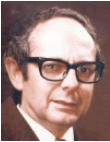
|
Ben Novis
In January 1970, Carol and I, recently married,
arrived in Cape Town to start my fellowship and
career in gastroenterology. On my first day at work, I
asked Solly and Simmy what my duties would be
and they told me my main function would be placing
two nasogastric tubes into the poor patients who
were to have a pancreatic function test.
This was to be done using the old X-ray screening
unit wearing special goggles. I soon settled into this
job.
|
When I questioned the necessity for so many
PFTs a week later, Solly shot back: "This isn't sheltered employment here in J1.
(That was a favourite phrase we were all to hear many more times over the years.)
The first weekend, we were invited for Sunday afternoon tea and the compulsory
tour of the famous Protea garden. The star performer was Karin, then about 3 or
4 years old, who knew and could spout off, to the obvious pride of her father, the
name of every protea in that enormous, magnificent garden. I'm sure, like almost
every other visitor, we were slightly shamed at being shown to be so ignorant in
comparison to a small child. Perhaps we were meant to be!
This was the first of numerous wonderful dinners and parties so superbly arranged
by Inge in their gracious Constantia home. Whenever an overseas visitor came to
Cape Town, it was the duty of one of the junior doctors to fetch them at the airport
" and sometimes more. One visiting gentleman, who spoke little English,
wore out his welcome at the Marks' guest suite. He exasperated Solly so much
that one evening I got a phone call from him. "It's your turn to take him out!" he
demanded.
A whole generation of gastroenterologists grew up in the bowels of Groote Schuur
hospital J1. The GI clinic became renowned for its clinical excellence and academic
productivity. Solly, together with Simmy, was the prime figure in instilling in
us a love of gastroenterology, in teaching us how to critically appraise the literature
and not to casually accept every new technique. He always warned that the
cost benefit to the endoscopist often outweighed the cost-effectiveness to the
patient. He believed, as he put it, that one should treat the patient as a whole and
not the hole in the patient. This has remained with me throughout my career.
Solly taught me the importance of a relaxed, friendly atmosphere when seeing
patients in clinic consultations and for endoscopy. I remember some mornings
when Simmy was not available to help him in his Foreshore office, and I was called
in. The patient was always offered a cup of coffee and a cigarette (!) after the procedure,
and, in this wonderful atmosphere, he proceeded to explain the medical
situation in plain, non-medical speech. With dignity, care and empathy he practised
both the art and the science of medicine, for the patient's benefit. Solly
taught me the importance of the head of the department also being available to all
the staff and taking an active part in furthering their careers, as well as being interested
in their lives outside the hospital. He was a wonderful mentor, and an example
to us all.
After I left Cape Town to set up a gastroenterology department at Meir hospital in
Israel, Solly also kept close contact and was helpful in finding a donor for equipment
to start the endoscopy service. Letters went back and forth about various
patients with possible alpha chain disease and the possibility of short sabbaticals.
When many of the senior doctors left for overseas posts, Solly took over the tricky
manoeuvre of riding two horses, at the same time hoping he would not end up on
his glutei.
When Solly gave up private practice, not an easy decision, he wrote to me that this
was not made easier by the knowledge that many of his chronic "metsiahs" would
continue to haunt him in his new surroundings as full-time Chief of
Gastroenterology. An unforgettable experience was the 25th anniversary of the
Gastrointestinal Clinic in 1984. Almost all members of staff, from consultant to registrar,
ex and present, attended for a weekend of congresses, partying and wine
tasting, in a spirit of camaraderie, nostalgia and scientific endeavour.
The GI clinic that you established Solly, and ran for so many years, was undoubtedly
one of the finest in the world. It provided a scientific basis to gastroenterology
in Cape Town and South Africa, with basic and patient-oriented research. I feel
enormously proud and privileged to have been associated with it. The number of
gastroenterologists world-wide who passed through your sharp, critical, but very
humane training, is a testament to this.
Ben Novis
Tel Aviv University
Israel
|
| |
| |
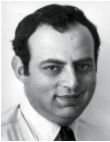
|
Jonathan Clain
It is with considerable pleasure and appreciation that
I write this short tribute to Professor I.N. (Solly)
Marks, father of gastroenterology in South Africa and
mentor to a generation of gastroenterologists from
around the world.
After training in gastroenterology in the United
Kingdom and the United States, Solly returned to
South Africa where he established the GI unit at
Groote Schuur Hospital in 1959.
|
In those early days
the clinic was run out of one or two rooms in J1 and stories of those times
abound. (One of my favourites is about the man who, despite mild protest, was
urged to swallow a nasogastric tube for gastric analysis, and only later managed
to articulate that he was attending the Dermatology Clinic next door!) Solly
Marks and Simmy Bank, then a young full time Fellow, set to work and created a
clinical service and laboratory for the investigation of gastrointestinal disorders.
Their clinical expertise and reputation at home and abroad soon became known.
I joined the unit as the senior registrar in 1973, and my association continued
later as a consultant until 1979. Working with Solly was a unique experience. His
clinical acumen and wise counsel were always valuable, and the constant stream
of patients from his practice admitted to the gastrointestinal service instructive.
Care of the patient and intellectual honesty were paramount. He worked hard,
and he expected and received the same from his staff.
Particularly memorable were the long Tuesday afternoon rounds, attended by the
entire unit staff and often surgeons and visiting clinicians. This provided a fertile
learning experience in which we were all encouraged to participate, even if we,
the junior staff, were occasionally admonished by Solly, who, when one made an
obvious observation would retort with the comment "And who do you think you
are? Christopher Columbus?"
Solly was always generous in many ways to his colleagues, nurses, laboratory
technicians and patients. However, his late arrival at Monday afternoon outpatients
was routine, at which time he fully expected that the entire support staff
would rally around him. Their perennial annoyance was soon dissipated by his
sweet talk, but he could never be cajoled to arrive on time! His notes were organized,
his script clear, and a cryptic comment such as "apples" written in the margin
meant that the patient had an apple orchard and had promised to bring
apples at the next visit, the margin note a reminder for Solly to ask for them!
Memories of evenings when we would gather for a unit party around the swimming
pools at his gracious home in Constantia live on. He and Inge were
wonderful hosts, and made us all feel welcome, down to the most junior staff.
There are many more memories and "Solly stories", too many to enumerate.
There are not many days that go by when I am not reminded of him by some
occurrence in my clinical practice. I think I can speak for all of my colleagues,
when I say that Solly's influence has left a lasting mark on all of our professional
lives.
Jonathan Clain
Mayo Clinic
United States of America
|
| |
|
|
CAPE TOWN &
PRACTICE PERSPECTIVE
|
|
| |
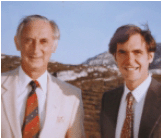
|
Andy Girdwood
My first task for Solly was to dig out the
Calcifics and help him with a presentation
on the first 300 patients with
Calcific Pancreatitis for the World
Congress in Madrid in 1978. Nel handed
me the legendary spreadsheet, which
was like the Holy Grail in the GI Clinic,
with all the clinical information painstakingly
documented by Solly, Simmy, Gib
et al. At the time I had no idea of the
magnitude of work that had gone into
compiling the information but on going through the data with Solly it became
clear that he knew all of these patients personally.
|
We were trying to establish
whether the onset of steatorrhoea preceded diabetes in Mr David Swart when
Solly said, "I remember that guy; he was in Jannie's ward and ruptured a pseudocyst
through his transverse colon " check the bookie, Andy!" Sure enough on
checking the bookie " the GI clinic cribsheet of the Groote Schuur Hospital notes
" in 1967 in B1 Mr Swart's abdominal mass disappeared and his clinical condition
improved after a big bowel action where he passed "membranes". This was
the start of many visits to Southern Cross House, and then Dunkeld Lodge, carrying
the tray of bookies and the Calcific spreadsheet. Initially this involved collecting
the raw data, tabulating it and then the impossible task of "putting pen to
paper" and agonising over every sentence into the early hours of the morning
with Solly calling the tune and Flip and I falling asleep.
In 1981 I joined Solly in private practice in Medical Centre to find that his practice
clientele were like his Calcifics. Each had a card where the presenting complaint
in their own words was carefully documented in Solly's neat handwriting.
Interestingly enough 20 " 30 years later many functional patients will have exactly
the same complaint. It is always said that a good clinician is a good listener
and certainly Solly had the ability to put even the humblest patient at ease and
allow them to express themselves. He never forgot his Woodstock and Graaff
Reinet roots. I think that Solly's great strength, however, was his ability to get
patients to listen to him. On the one-to-one consultation, he was devastating.
I still hear patients in their eighties coming out with pure"Markese" from a single
consultation in the "60's: "He told me that I funnelled my emotions through my
rectum" or "I should keep my mouth closed in the South-Easter". Patients have
their initial consultation with Solly imprinted on their brains. One lady in her 50's
told me that she saw Solly on her honeymoon in Cape Town from Johannesburg
and during the consultation she realised with crystal clarity that she had married
the wrong man. She is now happily married to her second husband thanks to
Solly's insight, she told me.
Anecdotes with Solly in practice are many. One I remember was with Mrs Budd,
his long-standing secretary/receptionist/endoscopy nurse who he inherited from
Louis Mirvish in 1960. Mrs Budd came to me and said, "We have a crisis, come
quickly". I rushed through to the endoscopy room expecting some endoscopic
disaster, to find an elderly, bejewelled dowager, Mrs Levy, stating emphatically,
"These are not my teeth!" Solly, Mrs Budd, Mrs Levy and I peered into the waiting
room. Solly, I must add, practiced Robin Hood medicine " relieve the rich to
subsidise the poor " and there were all walks of life in the crowded waiting room.
In the corner sat Mr September, drowsy from his valium, but knocking back a
bacon and egg sandwich with ill-fitting dentures, "Don't worry", said Mrs Budd,
pulling the dentures out of his mouth, "we will just give them a quick rinse".
Solly left a legacy of old patients who remain eternally grateful of what he did for
them and many of them had no idea what he achieved "up the hill" or of his international
reputation.
Andy Girdwood
Cape Town
|
| |
|
|
SOLLY ‘IN ACTION'
|
|
|
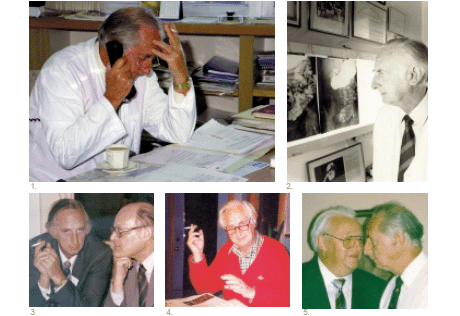
|
- Easy; three things at a time
- "Missing nothing........got the nose for it......"
- "Penny for your thoughts" with Basil Hirschowitz
- "Don't worry, we will finish it tonight"
- Taking advise from Judge President George Munnik
|
|
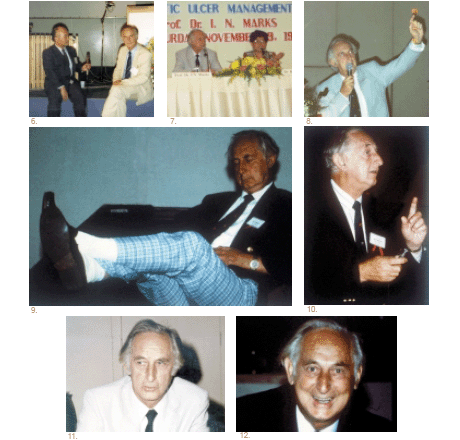
|
- Make as if interested"¦"¦
- It pays to advertise
- "Reaching for statistical significance"
- "I'm listening"
- "Meneer die Edelagbare"
- ".......Not sure about that........"
- "Don't be fooled........it's coming"
|
|
|
GI STAFF
|
|
Gerry Young
For several decades people from all over the world worked in the GI Laboratory
" Chinese, Kenyan, American, Swiss, Dutch, German, Scots and of course South
Africans representing the full spectrum of our rainbow nation. There were pancreatic
and pepsin pundits, juice extractors, upregulators, acinar cell activists,
guinea pigs of the two and four-legged varieties, helicobacter heroes and heroines
and nicotine and caffeine addicts (since converted !)
To all members of this disparate group Professor Marks (aka The Godfather) was
an inspirational guiding force, a severe but fair critic, a dispenser of wisdom and
a coiner of phrases. So as not to confuse us with the facts (!!) we had to remember
that, whichever way you turn, your tochas is always behind you. Like some
peoples' wives, we may not have been the best in the world but we were the best
he had. Conversely while he may not have been the best boss in the world he
was certainly the best we ever had. Prof - the lab salutes you.
Gerry, Nel and Sharon
Helene Negrine
Dear Prof Solly
On behalf of the nursing staff of the GI Clinic, we remember you with fondness
and would like to pay tribute to you, our mentor.
We thank you for all your wisdom, guidance, moral and loyal support you have
given and the respect that you have shown us.
Mrs Helene Negrine
Chief Professional Nurse
GI Clinic 1972 - 1997
Maureen Bloch
Working with Solly was an unforgettable experience. We had our rows during my
25 years in the Clinic, but we had plenty of good times and laughs too. I miss the
place very much. We were a real family.
Maureen
Wendy Lucke
It was an honour and privilege to work for Solly Marks, charismatic father of GIT
Unit. No matter how busy, he was always approachable, giving time which would
prove beneficial, enriching and seldom without a joke.
Thank you Prof
Love
Wendy
|
| |
|
|
GI CLINIC - SNIPPETS OF
SOLLY'S FIEFDOM
|
|
|
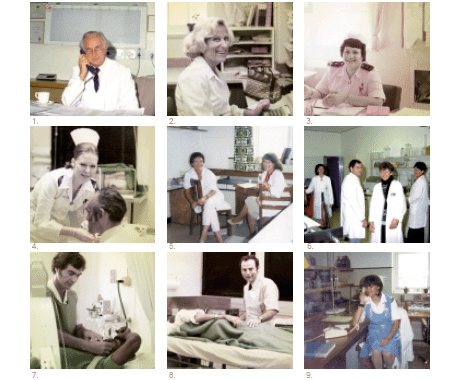
|
- The Boss
- Maureen Bloch - managing a smile after 25 years with Solly
- The Other Boss (Helene Negrine)
- Good Queen Bess ( Betty Heselson)
- Margaret Levy & Wendy Lucke
- Lab in Action
- Andy Girdwood - "Relax, only takes 6 hours"
- Dis net ‘n "Clain pypie"
- Angie - Forever Present
|
|
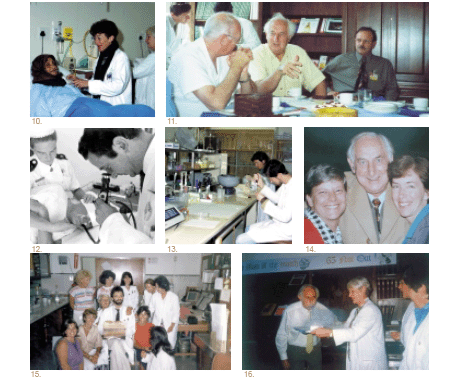
|
- Sharon & Nel having fun
- Educating the Surgeons
- Simmy Bank (beginning of Fibre optic endoscopy)
- Mark Kidd ("Lab Rat")
- Always time for a hug (Barbara & Marie)
- Francesco Marotta ("Italian Loverboy")
- 65th - Not Out !
|
| |
|
|
25 YEAR REUNION : GI CLINIC
|
|
|
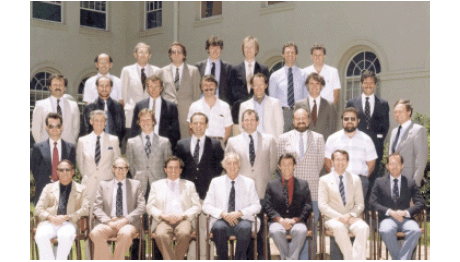
|
GASTROINTESTINAL CLINIC
1959 " 1984
Back row: Dr R Tobias, Dr OAA Bock, Prof F Halter, Dr EJS Boyd, Dr JP Wright, Dr JAM Garisch, Dr S Voget
3rd row: Dr PC Bornman, Dr G Münst, Dr SJD O'Keefe, Dr R Roost, Dr ME Denyer, Dr AH Girdwood, Dr M
Danilewitz
2nd row: Dr A Neeman, Dr DG Burns, Dr I Kalvaria, Prof JE Clain, Prof C Helman, Dr HS Odes, Dr L Bank, Dr ARW
Hatfield
Front: Dr B Lurie, Prof BH Novis, Prof S Bank, Prof IN (Solly) Marks, Prof GO Barbezat, Dr AS Mee, Dr NH Gilinsky
|
| |
|
|
MESSAGES FROM COLLEAGUES
ROUND THE GLOBE
|
|
| |
Selwyn Odes
To Solly, my friend and mentor, one of a few people who helped me formulate my
professional career. I owe you so much, Solly. Carry on in health and humour,
knowing that your very presence inspires and terrifies your audience.
Selwyn Odes
Israel
Raymond Tobias
I appreciate the opportunity to congratulate you, Solly, on the honour bestowed
on you at the SAGES annual meeting. Your exceptional mentoring, work ethic,
encouragement, sense of humour and at times "biting sarcasm" are fondly
remembered; more so now that I am also involved in teaching residents in the
Baptist Health System in the Deep South Bible Belt. Comments like "Nothing
short of the Resurrection will cure that patient's abdominal pain" and gently
reminding my surgical colleagues that operating in the face of acute pancreatitis
is like "sewing moonbeams to flatus", are still frequently quoted by me.
Good wishes and warm regards
Raymond Tobias
Birmingham, Alabama, USA
Alexandre Kummer
To Solly, who gave me the opportunity to come to Cape Town fifteen years ago,
something which had a tremendous impact on my life. You created an interest in
GI which determined my profession. Besides the academic medicine you taught
me the human side of medicine in your unique way of seeing the person behind the
patient, with a mixture of genuine interest, warmth and humour. Last but not least,
you were certainly not uninvolved in Elana and myself meeting. Solly, we wish you
an evening to remember and feel privileged to be here with you and Inge tonight.
Alexandre Kummer
Switzerland
Norman Gilinsky
Dear Solly:
While Stephanie and I are unable to join you and Inge in person in recognizing
your wonderful achievements, we are certainly with you both in spirit.
Solly, I remain truly grateful for your guidance, advise, imbuing in me a healthy
sense of skepticism, and being a world-class mentor during my G.S.H. days.
I recall one occasion, late after rounds, you spending hours enthusiastically virtually
re-writing a paper I had hurriedly put together. The lessons and pearls I was
receiving came to an abrupt end when Inge called, reminding you that it was your
wedding anniversary and you were well overdue home! While I appreciated your
tutelage on many occasions then, hopefully you have adjusted your priorities
now! Solly, be well, enjoy this evening and go from strength to strength.
An ever-appreciative Norman Gilinsky
University of Cincinnati
United States of America
Thomas Lingenfelser
A "medicus" by conviction and orchid lover by passion, Solly Marks succeeds the
late Leonhart Fuchs from Tübingen who held the chairs of medicine and botany
at its renowned university in the 16th century. He once accepted a young
research fellow from Tübingen medical school to his Department in order to
relentlessly instigate his interest into gastroenterology. That is why I am privileged
to extend my sincere gratitude to "my professor", my archetype of clinical and
academic excellence, for pertinaciously teaching me how to take care of patients
with gastrointestinal disease.
Thomas Lingenfelser
Germany
Trevor A, Winter
Dear Solly,
Congratulations on all your achievements and contribution to Gastroenterology in
South Africa. In particular, I would like to thank you for your penetrating wisdom
and guidance over the years I have known you.
Wishing you all the best for the future.
Trevor
|
| |
|
|
A SAMPLE OF CLASSIC "SOLLYISMS"
|
|
"Mundus vult decipe, ergo decipiatur"
"And all the Egyptians were drownded"
"It is more important that a proposition be interesting, than it be true"
"The aim in treating constipation is to get the patient to pass a large banana"
"Knowing when to do a test is more important than knowing how to do it"
"See the patient before the laboratory data"
"Before getting too excited about a statistical result, ask if it really means
anything to the patient"
"Nothing short of the Resurrection will cure that patient's abdominal pain"
"Sewing moonbeams to flatus"
"It is only the fish who open their mouths that get caught"
"From the foot of the bed : Neanderthal !"
Concerning anyone who may have a sexually transmitted disease : "Have you
asked them about perineal nystagmus ?"
"In my day research was 90% thinking and 10% gadgets; now it's the other way
round". (circa 1970's " what is he saying now ?)
A few seconds before withdrawing a semi-rigid gastroscope and manually
pumping the patients' stomach full of air: "Metro Goldwyn Meyer presents !"
"Even an autopsy wouldn't tell us what is going on in this patient"
"Nothing but the Resurrection will make this guy/girl better"
Instruction top patient on how to find his rooms for a follow-up visit : "Get off the
train at Cape Town station and then follow the crowds"
"We like to learn, but we hate being taught"
Giving an article to read with instructions " "Compulsory toilet reading"
"God is good and Allah is merciful"
|
| |
|
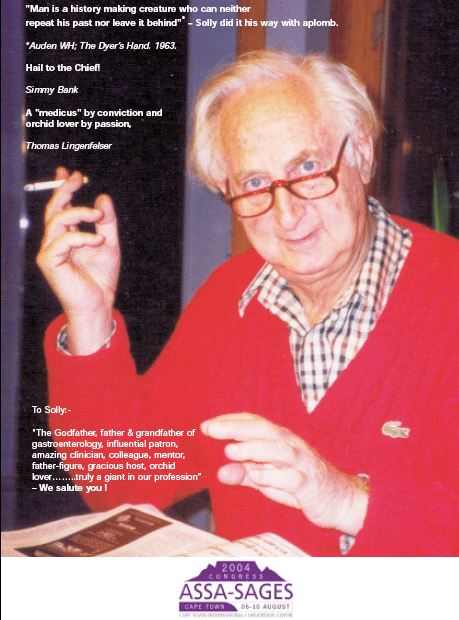
|
|